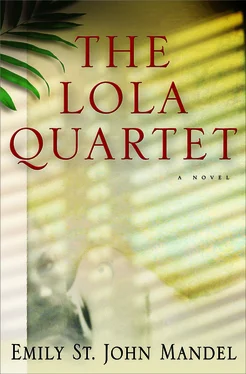"What happened to that girl who was staying here?"
"Grace," Jack said. "I don't know what's happening to Grace. She left earlier in a funny dress." He remembered his saxophone and lifted it from the grass.
"Who did she leave with?"
"Anna," Jack said. "She left with Anna."
"Do you know where Anna is?"
"No."
"I want to talk to her," Gavin said, but Jack thought he was talking mostly to himself.
"Why would you want to talk to Anna? When has Anna ever done anything good?" Jack wasn't sure if he'd spoken aloud. He was floating. The saxophone was warm and clammy in his hands and it caught the light from the house, an ethereal shine down the curve of the bell. He liked looking at lights when he was in this state. All the edges were shimmering. "I'm going to play again," he said.
"Wait," Gavin said.
"What for?"
"Jack, listen, it's none of my business, but it seems like maybe you're taking a lot of pills."
"The thing with this arrangement of 'Summertime,' " Jack said, "is you can just keep it going. There's the first section that everyone knows, and then—"
"What are you on, Jack? Is it Vicodin? Oxycontin?"
"I'm going to play again," Jack said. Playing, he had realized, was something that would preclude talking. He wanted to fall back into music and rest for a while. He started playing "Summertime" at half-speed, almost a dirge, slow light all around him, and when he looked up some time later Gavin was gone. He drifted alone in his lawn chair on the grass.

When Gavin reached his apartment he took two Vicodin and flushed the rest down the toilet. He sat for a long
time in front of the television. Remembering nothing of the programs he was watching, bone-tired, anesthetized by the flickering blue light. When he allowed his thoughts to wander he imagined an alternative version of events: he arrives in Florida on assignment from the New York Star , spends a few days interviewing people about the exotic-wildlife problem, following William Chandler around swamps, writing up his notes in a Ramada Inn in the evenings. Until finally he meets Eilo for dinner in a seafood restaurant, and this is where the fantasy begins: they have a pleasant dinner and he drives back to the hotel afterward, and the difference between this scene and what actually happened is that when Gloria Jones's house goes into foreclosure the bank calls a different broker, not Eilo, so Eilo never goes to Gloria Jones's house and never has a photograph to give him.
.
G a v i n d i d n ' t realize he'd fallen asleep until he heard the doorbell. He started awake and the television was showing a nature special, seagulls wheeling through the air above a rocky shore. He stood up, his heart beating too quickly, and the doorbell rang again. It was four in the morning.
At the bottom of the stairs was his front door, and on the other side of this a dusty foyer where his mail was delivered. The door between the foyer and the street was steel with a dusty spyhole that he'd never looked through. The glass was so greasy that he saw only a vague shadow, a man standing outside with his arms folded over his chest. He couldn't tell who it was. Gavin got down on one knee and called through the letter slot. "Who are you?"
"Liam," the man said. "It's Liam."
Gavin only knew one Liam. There was no reason to let him in except his own desperate curiosity, and the shock of Liam Deval being there at all; here after all these weeks was his story, waiting on the other side of another door. Gavin unlocked the door and opened it a crack.
Liam Deval was shivering in the streetlight. "Can I come in?"
Gavin stood back, and Deval slipped past him into the foyer and up the stairs. In the light of the apartment Deval looked malarial, glittery-eyed and shivering with streaks of sweat down his face. His hair wet against his forehead, sweat coming through his shirt.
"I came to apologize," Deval said. "I'm sorry. I can't tell you how sorry I am." He was looking at Gavin's arm in the sling. Gavin nodded but said nothing. He wasn't sure what a person was supposed to say in these circumstances, what the etiquette was for forgiving or failing to forgive the man who'd sent a bullet into your arm. His bandages itched.
"I never would have done it if I'd known who you were," Deval said. "Why did you let me in?"
"That's a good question. Curiosity, I guess."
"Is it okay if I just stay here for a few minutes?"
"Are you armed?"
"I threw it away," Deval said. "Can I use your bathroom?"
"It's there on the left." Deval stood before the bathroom sink and began methodically scrubbing his hands with soap and hot water. Steam rose and clouded the mirror. Gavin left him there and went into the living room. He turned off the TV and straightened the pile of newspapers, moved his cameras from the coffee table to the lower shelf of the television stand. "Can I offer you anything?" he asked, when Deval emerged from the bathroom. Deval's eyes looked unnaturally bright.
"Do you have any alcohol?"
"Alcohol, no, I've just got juice and orange soda. Or I could make some coffee if you'd like."
"You have any lemons?"
"Lemons?"
Deval nodded.
"Actually, I think I might."
" Would you mind boiling some water," Deval said with curious intensity, "and then squeezing some lemon juice into it? I know it's a strange request."
In the kitchenette Gavin filled the kettle, put it on the stove and began searching one-handed in the fridge. A slightly desiccated lemon was hiding behind a ketchup bottle. "I used to go to Barbès to hear you play," he said, to break the silence. He sensed Deval watching his every move.
Deval's eyes seemed to focus. "Barbès," he said. "Barbès. Really?"
"Before I knew you were involved in. in any of this," Gavin said, trying to keep the frustration at the fact that he still didn't know ex actly what this was out of his voice, all he had to go on was his own wild conjecture, his guesses, his suspicions and his paltry trail of clues. "Whatever you're involved in. I used to go every Monday night. Feels like a different lifetime."
"Barbès," Deval said. "I was just thinking of that place a little earlier."
Gavin heard a noise he couldn't immediately identify, and he realized that Deval's teeth were chattering. Gavin turned off the air conditioner, opened the other window in the living room as far as it would go. Soft sounds of traffic drifted up from the street. The heat at this time of night wasn't terrible.
"I used to stand at the back," Gavin said. He walked past Deval into the bedroom and pulled a blanket from the unmade bed. Deval was staring at him through the doorway, as if Gavin's words were all that kept him from floating off. "I was there listening to you every week for a while, you and Arthur Morelli. I loved your sound."
"I loved it too," Deval said.
"Why did you stop playing together?"
"We had a falling-out." Deval reached for the blanket and pulled it close around him. "It's hard to play with someone for a long time. It's like a marriage. Sometimes it lasts forever, sometimes you get sick of each other, sometimes the other party gets tired of playing the rhythm part."
The kettle was whistling. Gavin found a clean mug and filled it, but the lemon was hard and almost dry. He squeezed as hard he could with his good hand. He could only get a few drops out of it, but Deval didn't complain when he raised the hot water to his lips.
" Thank you," Deval said. The drink seemed to calm him. He sipped, gazing around at the unremarkable room, and his shivering subsided.
Читать дальше













